Gibraltar 2005 "Gibraltar Anniversaries"
| <prev | back to index | next> |
| Issue Date | 17.06.2005 |
| ID | Michel: 1130-1132; Scott: 1018-1020; Stanley Gibbons: 1139-1141; Yvert et Tellier: 1136-1138; Category: An |
| Design | Designer: Stephen Perera, Photos from Gibraltar Archives |
| Stamps in set | 3 |
| Value | 38p - Gibraltar Police Force 47p - Objects from the Gibraltar Museum. Neanderthal skull at left. £1 - Charter of Justice for Gibraltar |
| Emission/Type | commemorative, |
| Issue places | |
| Size (width x height) | 40.64 x 29.8mm |
| Layout | |
| Products | FDC x1, PP x1 |
| Paper | |
| Perforation | 14,75 x 14,25 |
| Print Technique | Offset Lithography, Multicoloured |
| Printed by | BDT International, Ireland |
| Quantity | |
| Issuing Authority | Gibraltar Post |
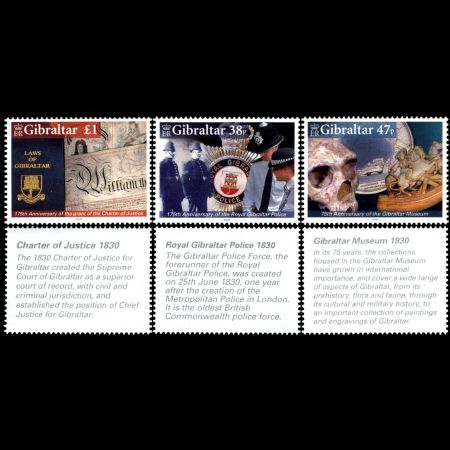
On June 17th, 2000, the Postal Authority of Gibraltar, issued the set of three stamps "Gibraltar Anniversaries". These stamps were printed with the explanatory text on the back.
- 175th Anniversary of the Royal Gibraltar Police
- 75th Anniversary of the Gibraltar Museum - the stamp with the Neanderthal's skull.
- 17th Anniversary of the grant of the Charter of Justice
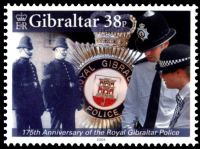 |
| 175th Anniversary of the Royal Gibraltar Police, stamp of Gibraltar 2005, MiNr.: 1130, Scott: 1018. |
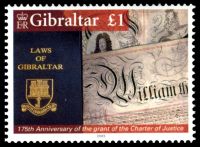 |
| 175th Anniversary of the grant of the Charter of Justice, stamp of Gibraltar 2005, MiNr.: 1132, Scott: 1020. |
The 1830 Charter of Justice for Gibraltar created the Supreme Court of Gibraltar as a superior court of record, with civil and criminal jurisdiction, and established the position of Chief Justice for Gibraltar.
The second stamp in the set, with the face value of 47p, was issued to celebrate 75th Anniversary of the Gibraltar Museum. In its 75 years, the collections housed in the Gibraltar Museum have grown in international importance, and cover a wide range of aspects of Gibraltar, from its prehistory, flora and fauna, through its cultural and military history, to an important collection of paintings and engravings of Gibraltar.
The skull on the left side of the stamp is the first adult Neanderthal skull - Gibraltar-1.
Gibraltar-1 is the name given to a Neanderthal skull, also known as the Gibraltar Skull, which was discovered at Forbes' Quarry, during quarrying operations in a brecciated talus on the north front of the Rock of Gibraltar. The skull was presented to the Gibraltar Scientific Society by its secretary, Lieutenant Edmund Henry Réné Flint, on 3 March 1848.
 |
| The Neanderthals, the pane from the prestige booklet, Gibraltar 2000. MiNr.: 916, Scott: 841c - of the stamp. |
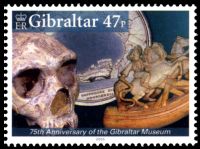 |
| 175th Anniversary of the Gibraltar Museum, stamp of Gibraltar 2005, MiNr.: 1131, Scott: 101i. |
The skull on the stamp is the photo of the specimen from the collection of the Gibraltar Museum. However, initially it was thought to depict the skull as a drawing. One drawing was created by Sean Matto as a watercolor. It was submitted to Gibraltar's Post, but wasn't approved.
Its significance wasn't recognised at first. Found more than ten years before the publication of Charles Darwin's "Origin of Species" and eight years prior to the famous discovery in the Neander Valley, the significance of the find was not understood at the time, and the skull was simply labelled as "an ancient human, died before the universal flood" and remained forgotten inside a cupboard at the Garrison Library for many years. Only eight years later the amateur naturalist Johann Fuhlrott identified a similar skull and additional remains in the Neander Valley in Germany. In 1864, it was named as a new species of human, Homo neanderthalensis.After the publication of "Origin of Species", a renewed interest in the fossil human remains led to the skull being brought out of obscurity, and presented at a meeting in the British Association for the Advancement of Science in 1864, at Norwich, England.
In 2009, many Post Administartions around the world commemorated both the 200th Anniversary or bicentenary of the birth of the greatest naturalist in history, Charles Robert Darwin, and the 150th Anniversary of the publication of his most famous work On the Origin of Species by Means of Natural Selection.
Darwin was not present, but the skull was later examined by both Darwin and Thomas Huxley, who concluded the skull was that of an extinct human species. Charles Darwin did however only make fleeting reference to Gibraltar-1 in the 1871 "Descent of Man".The skull is dated to between 30 thousand to 50 thousand years old. A cast of the skull can be viewed at the Gibraltar Museum – the original is on display in the Human Evolution gallery of the Natural History Museum in London.
Products and associated philatelic items
| FDC | Presentation Pack | Artwork of Sean Matto |
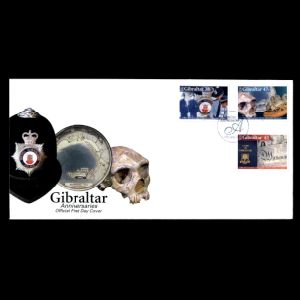 |
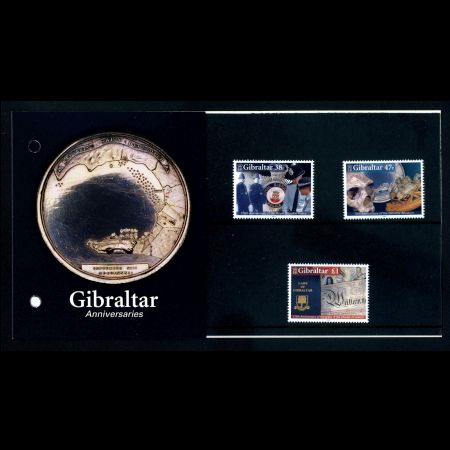 |
 |
| The reverse side is here. | The artwork from the collection of fellow collector Peter Brandhuber, from Germany - watercolor, created by Sean Matto. | |
| Example of circulated covers | ||
 |
|
|
References

|
- Technical details and official press release:
Gibraltar post, The reverse side of Presentation Pack, The reverse side of stamps. - The Gibraltar Skull (Gibraltar-1) Wikipedia, NHM UK.
Acknowledgements
- Many thanks to Dr. Peter Voice, PhD Department of Geological and Environmental Sciences, Western Michigan University, USA, for his help in finding information and for review of a draft of this article.
- Many thanks to fellow collectors Peter Brandhuber from Germany (who run "Evolution of mankind and Philately" group on facebook) for his help finding information about these stamps and for provided scans of philatelic items from his collection.
| <prev | back to index | next> |